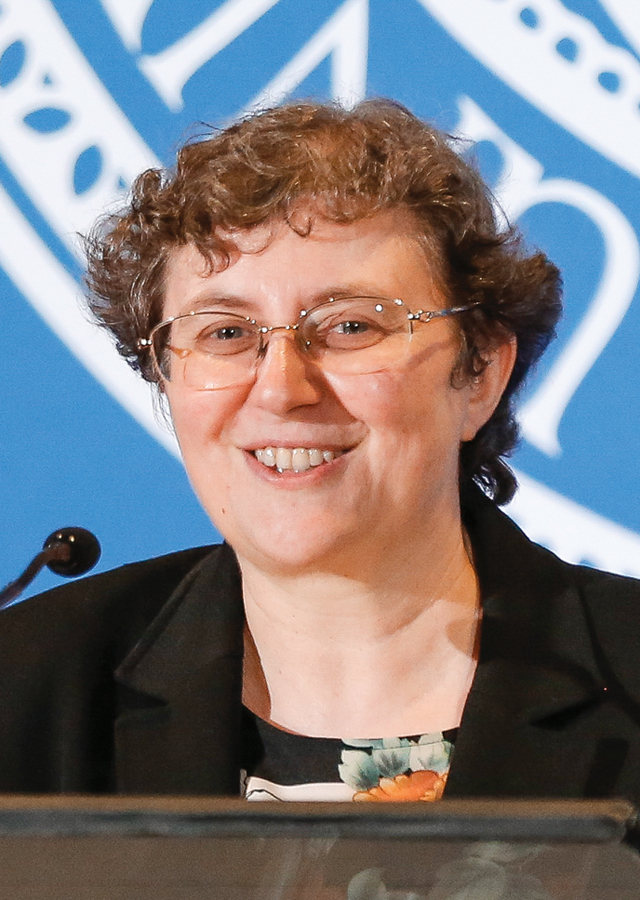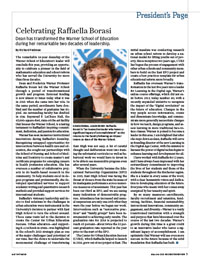President’s Page
 EDUCATIONAL LEADERSHIP: Raffaella Borasi is “an innovative leader who leaves a significant legacy of accomplishment” as she returns to the faculty following an 18-year tenure as dean of the Warner School. (Photo: Matt Wittmeyer)
EDUCATIONAL LEADERSHIP: Raffaella Borasi is “an innovative leader who leaves a significant legacy of accomplishment” as she returns to the faculty following an 18-year tenure as dean of the Warner School. (Photo: Matt Wittmeyer)The remarkable 18-year deanship of the Warner School of Education’s leader will conclude this year, providing an opportunity to celebrate a pioneer in the field of mathematics education and school reform who has served the University for more than three decades.
Dean and Frederica Warner Professor Raffaella Borasi led the Warner School through a period of transformational growth and progress. External funding is now almost 10 times today what it was in 2001 when she came into her role. In the same period, enrollments have doubled and the number of graduates has tripled. An outstanding faculty has doubled in size. Raymond F. LeChase Hall, the 65,000-square-foot, state-of-the-art facility that houses the Warner School, is a lasting testament to Raffaella’s inspiring commitment, dedication, and passion for education.
Warner has seen numerous instructional innovations during Raffaella’s deanship. Recognizing untapped opportunities for intersections between health care and education, she sought out partnerships with the School of Nursing and School of Medicine and Dentistry to create master’s and certificate programs for emerging careers in health profession education. She has overseen a number of collaborative projects to do health-based research in the community. To help students excel in degree programs and professionally, she developed specialized services to support academic writing and quantitative research methods and provided support services for international students.
Raffaella’s visionary leadership and desire to find solutions to the challenges in urban education were instrumental in the University’s decision to partner with East High School to turn the school around. Those same traits led to the decision to create the Center for Urban Education Success. Urban education—and supporting K–12 schools in crisis—was highlighted in the school’s 2013 strategic plan as one of the major challenges (and priorities) of our time. But the choice to undertake the monumental challenge of transforming East High was not easy. A lot of careful thought and deliberation went into framing the substantial curricular as well as behavioral work we would have to invest in to be able to see measurable progress even after several years.
When the University became the Educational Partnership Organization (EPO) in 2015, East High School was facing the threat of closure from the state because of its inadequate performance across numerous measures of assessment. This year has been our third as EPO, and we are seeing many indications of demonstrable progress. Attendance has increased and annual suspensions are only one-10th what they were the year before we began our work. Interventions such as “restorative practices” and “family groups” have been instrumental to achieving early results. The graduation rate for 2018 is projected to reach 65 percent—about twice the 33 percent graduation rate reported in the year prior to the start of the EPO.
The Center for Urban Education Success (CUES), which Raffaella helped to launch in 2016, grew out of our project at East. The initial mandate was conducting research on urban school reform to develop a national model for lifting youths out of poverty. Since inception two years ago, CUES has begun the process of engagement with other urban schools and community members to build on the East EPO project and create a best practices template for urban educational reform more broadly.
Raffaella has overseen Warner’s transformation in the last five years into a leader for Learning in the Digital Age. Warner’s online course offerings, which did not exist before 2013, today number 40, with a recently expanded initiative to recognize the impact of the “digital revolution” on the future of education. Changes in the way people access information, create and disseminate knowledge, and communicate more generally necessitate changes in how we teach, design programs, and assess learning in more traditional face-to-face classes. Warner is poised to become a leader in this area. I am delighted that after she steps down as dean, Raffaella will serve as founding director of the new Learning in the Digital Age Center, with the mission to harness the power of digital technologies to enhance learning and development for all.
I have worked with Raffaella for 12 years, and I have always been impressed with her extraordinary commitment to improving the lives of her students and those of the students throughout the Rochester region. She is a leader in every sense of the word, with a clear humanistic vision and dedication to developing educators of the future. Everyone who meets with her comes away energized by her tenacity and spirit.
By so many measures—enrollments, faculty recruitment and retention, fundraising, facilities, financial sustainability, instructional innovations, community engagement, and diversity—Warner is a vastly transformed institution with a strength and purpose that have blossomed over the course of the last two decades. Warner’s growth during this time is a great credit to an innovative leader who leaves a significant legacy of accomplishment. I am optimistic that Warner will see even more success in the future because of the solid foundation that Raffaella has built.

